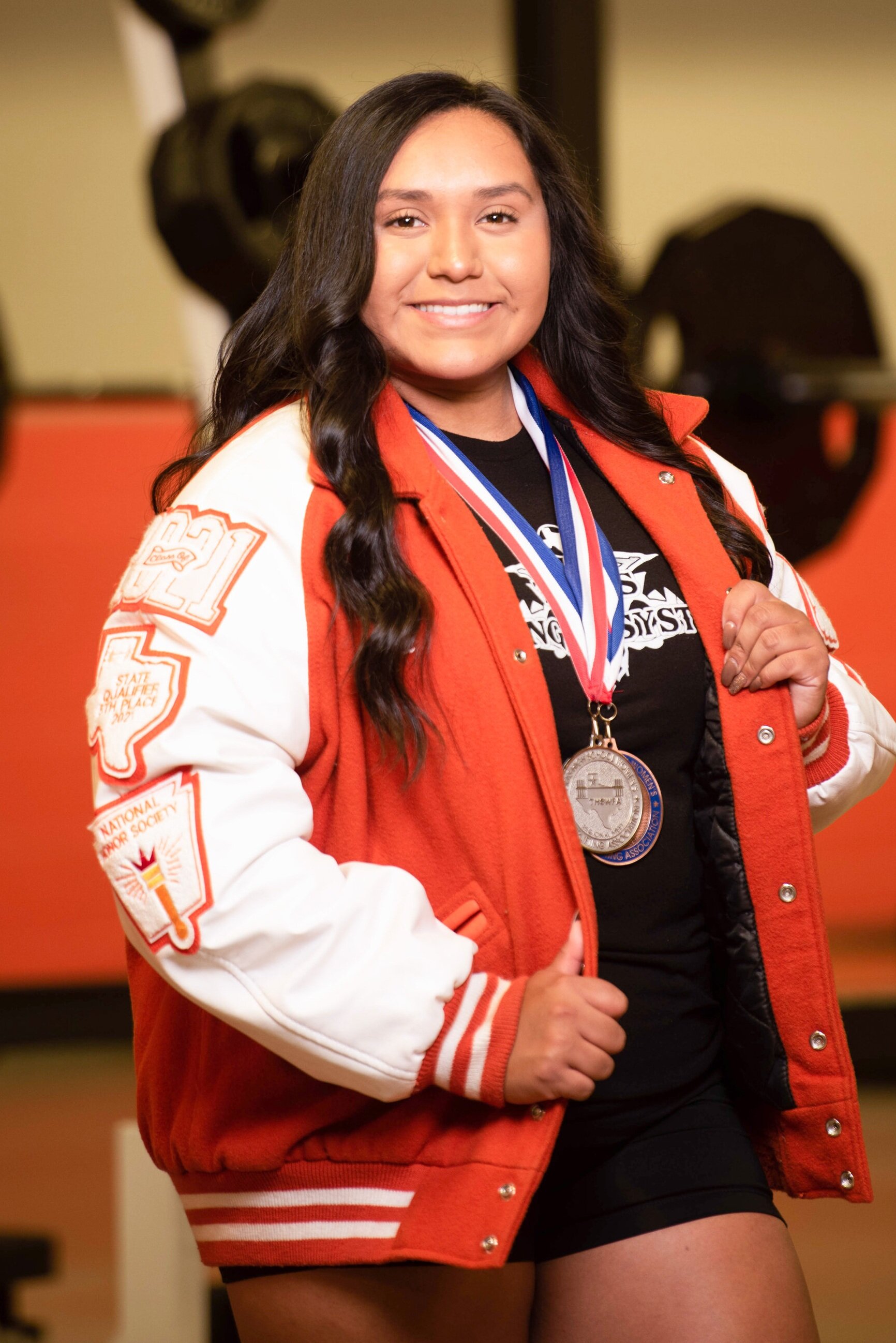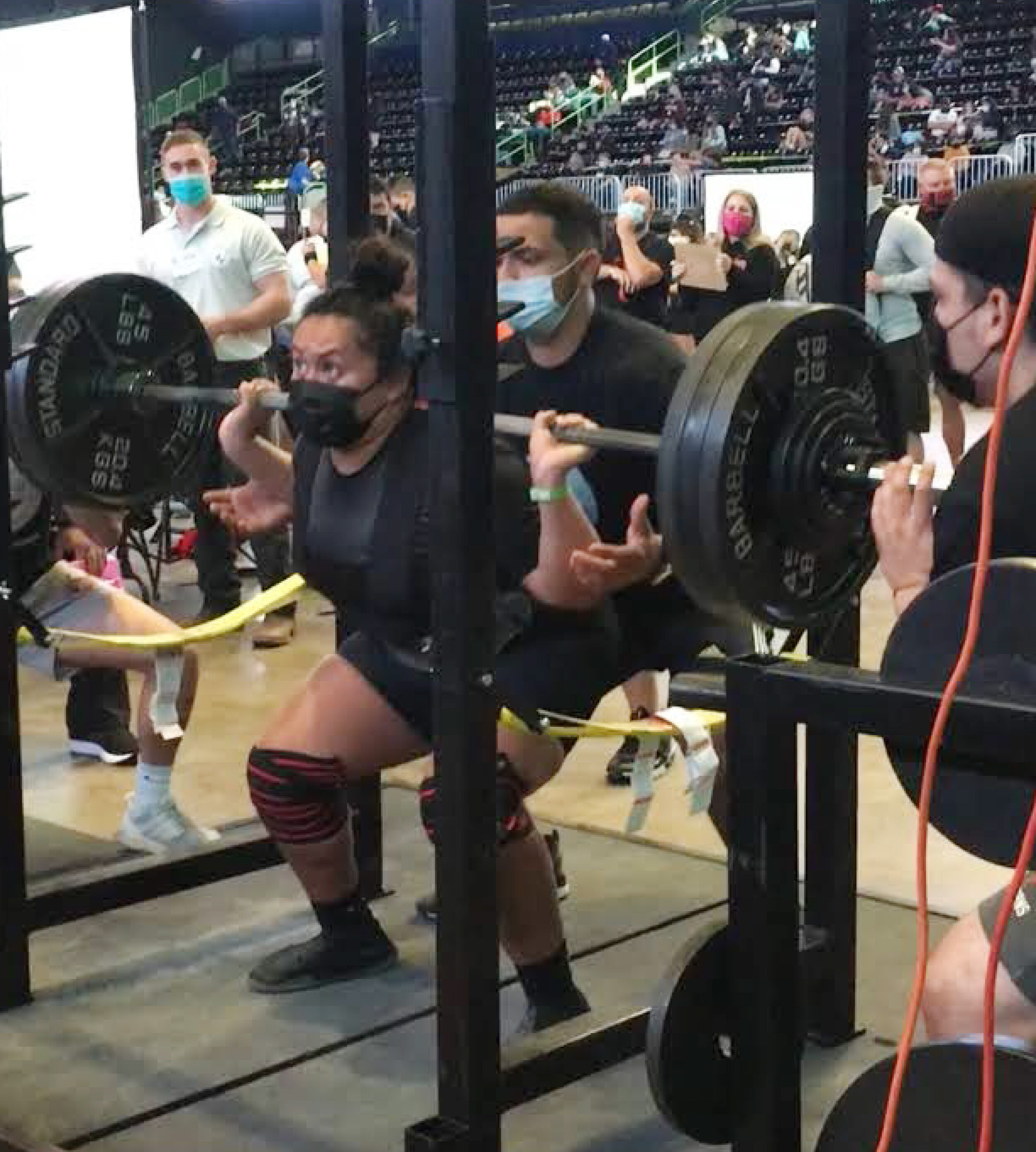PAEZ POWER
/For Mariza “Pi” Paez, strength just comes naturally for her, especially in the weight room
by AMBER E. WILLMAN
photo by ALAMOND PHOTOGRAPHY
Larry, Pi and Jessica after the state meet where Pi lifted a total of 835 pounds to take fifth place.
Pi squats 375 pounds during the state powerlifting meet.
In the current political climate, Title IX and gender equality is a battlefield. Soldiers advocate for equal pay, equal opportunity, and equal rights. Eighteen-year-old Mariza Paez is an accidental crusader in this ongoing war.
Nicknamed “Pi” by a seventh-grade volleyball coach, Mariza is a champion powerlifter. An unusual hobby to some, she did not join the predominantly male sport to be a soldier in the war for equality. She was inspired to follow in the footsteps of her father, Lazaro Paez. She grew up hearing him reminisce about his experience in the weight room, and it piqued her interest.
Texas High School already had a boys’ powerlifting team when Mariza came on the scene as a freshman. Already an established athlete in softball as well as discus and shot put for the track team, she was interested in powerlifting and begged for a girls’ team. But without a female coach, the biggest obstacle was dressing out. “You really need help to get into the uniform and equipment,” Pi explains.
Powerlifting requires specialized uniforms; the tighter the better. Everything from the material to the stitching is designed to protect the athlete’s body from injury. Getting into the uniform requires assistance, as does the accompanying knee wraps, knee sleeves, and wrist wraps. Bottom line is Mariza needed another girl.
Coach Franks, Pi, and Coach Harrell after the state powerlifting meet in Corpus Christi.
Although they frequently share the same meets, boys and girls compete in separate divisions. Coach Dalton Franks further elaborates that powerlifting is a very individualized sport. The major difference between training boys and girls is the actual load, but the mechanics is very similar. Each division is further split by weight class. Joining the boys’ team was never really an option.
The pandemic of 2020 ruined any chance of competing her junior year. But a new year brought a new opportunity. With graduation looming, Pi finally got her shot. She was joined by two more girls, fellow classmates, and the boys’ powerlifting coaches agreed to manage both teams. “Each meet was amazing. I always wanted to see my kids succeed. I would tell them, ‘You were born to be great. You were born to make your mark,’” Jessica Paez, Mariza’s mom, says of Pi and her three siblings.
Mariza’s goals were simple. Add weight each week and do more than you think you can. “It’s really a mind game. Its not about the weight because when you are lifting you have this adrenaline rush. But you really have to be confident in yourself.”
It was an excellent strategy that took her all the way to the state competition in Corpus Christi, Texas, in March. She was the second Paez to go to state; Larry had placed sixth just decades earlier. “He was really excited. He was really proud of me,” Pi says. “I think he was more nervous than me.”
Pi with her parents, Jessica and Larry, after she received her second place medal at regionals. Her father is also holding his second place medal from his high school days.
Larry Paez had every right to be proud. During the eight-hour drive to Corpus Christi, he and Jessica talked about the competition, but they could not predict that their daughter would surpass him. “She thought she had plateaued,” Larry says. “The strength comes natural. I knew she just had to get the confidence. I knew she had it in her all the time. She just needed to see it for herself.”
Mariza lifted a total of 835 pounds to place fifth in state ... 375 pounds in squats, 170 pounds in bench press, and 290 pounds in deadlift. Mariza was the only student from Texas High School to attend state this year and the only girl in school history to achieve this level of success.
“When I think about Pi, the first thing that comes to mind is she is a competitor. She always wants to get better. She wants to do more than the bare minimum. The second is how responsible she is. She was a virtual student this year, but she always showed up on time and always did what was asked of her. It’s her competitive nature and her work ethic,” Coach Dalton Franks explains what impresses him most.
Head Coach Jeremy Harrell echoes his colleague’s sentiments. “She competes so hard and wants to be the very best she can! In powerlifting she isn’t scared to fail, and she pushes herself to keep adding weight to the bar! She’s such a great young lady who has such a bright future ahead of her.”
Mariza has been courted by LeTourneau University in Longview, Texas. It’s a private Christian school, and while they do not offer athletic scholarships, they do offer academic scholarships. “I just want her to focus on academics. I’m excited that her academics brought her to this point ... that she is comfortable going wherever she wants to. I’m excited to see what she can do,” Larry says.
Equally important but perhaps more exciting, LeTourneau has girls’ powerlifting, and they want Pi. “Longview isn’t very far away,” Mariza explains. “It’s like a second home.”
Powerlifting is a family affair for the Paezes. This photo was taken of Larry doing a deadlift back during his lifting days.
“I would love more than anything to see her continue,” Jessica Paez adds. “She had a short season. I would hate to see her not do it again. It was very inspiring to see her handle this. I look forward to watching her continue in her college years.”
Pi would love to stay on an athletic path. With a desire to major in kinesiology, Mariza is considering physical therapy, but has not ruled out education. She jokes that she might return to Texas High School as the girls’ powerlifting coach.
But will there be a team to return to? “I’ve had a few girls reach out to me. Some freshmen and sophomores. I invite them to workout with me. I would love to see them exceed my achievements.”
Coach Franks acknowledges the need for the school to promote the opportunity for girls, but also encourages girls to reach out and let the coaches or other lifters know they are interested.
Pi has advice for future powerlifters. “They just need to be willing to put in the work. You just gotta be confident. You have to set your goals, and go for it.”
Pi’s story is far from over. In fact, it’s just beginning. In the war for equality, Mariza believes, “Women can do as much as men. Sometimes women can do more or do it better.” But she doesn’t lift to compete with men. Pi lifts to compete with herself. She lifts to dig deeper. She lifts to be the source of her own self-confidence.
With a brilliant mind, a sweet disposition, a competitive spirit, a natural athleticism, and genetics to boot, one cannot help but be inspired by Pi’s talent and skill. Powerlifting might not be an obvious contender when one thinks of hobbies or sports, but Mariza Paez is the author of her story.
And even though Pi is not necessarily an activist for equality she is certainly leading by example. Life is too short to live according to others’ expectations. As Pi’s story suggests, be diligent in asking for what you want. Do the work. Dig deep. Lift the weight. Be confident. As Laurel Thatcher Ulrich penned in 1976, “Well-behaved women seldom make history.”






